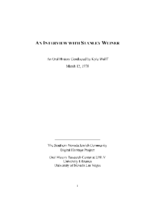Search the Special Collections and Archives Portal
Search Results

Transcript of interview with Harry Kogan by Barbara Tabach, January 12, 2016
Date
Archival Collection
Description
With a liveliness of a man decades younger, Harry Kogan looks at his 100th birthday with cheer and satisfaction. Born March 11, 1916 to poor Russian immigrant parents in the Jewish ghetto of Philadelphia, Harry vividly recalls walking to school shoeless, with no hat or no raincoat. A treat would be his mother handing him ten-cents to go to the theater and enjoy a silent movie. After graduating from high school in 1933, Harry quickly took one of the rare jobs available in a garment manufacturing company where he worked his way into being a skilled and valued fabric cutter-a job that paid $35 a week. Harry was raised with two brothers and lived in Philadelphia for the first 91 years of his life before moving to Las Vegas. One of his brothers learned the refrigeration business while enlisted in the Navy and after the war formed a commercial refrigeration business named Kogan Brothers. Harry is a philosophical and philanthropic man. He was slow to retire and traveled the world, took classes and donated to his favorite causes; among which are the Boys Town Jerusalem and the Jewish Federation of Las Vegas. He sat for this interview to honor his Jewish roots, to share his life experiences and spending the past years in Las Vegas.
Text

Transcript of interview with Harriet Trudell by Caryll Batt Dziedziak, May 3, 2006
Date
Archival Collection
Description
Born on August 22, 1935, Harriet spent her childhood years in the segregated southern cities of St. Petersburg, Florida and Mobile, Alabama. Daughter to a blue collar plumber, who was also a union organizer and ‘rabid Democrat,’ Harriet recalls her father saying, “Remember children, you know what meat tastes like because there’s a man named Franklin Roosevelt.” Unsurprisingly, she grew up thinking Roosevelt was God. With her mother’s sudden death at age thirty-one from a cerebral hemorrhage, ten year old Harriet spent two years at a boarding school before rejoining her younger brother at her maternal grandparents in St. Petersburg. Florida. During this time, her father also based out of the grandparents’ home while following big construction work opportunities at various cities. In 1948, sixteen-year-old Harriet accompanied her father, an Alabama Delegate, to the Democratic National Convention. Hearing Hubert Humphrey’s Civil Rights speech change her life. “I came home from that conve
Text

Transcript of interview with Gary Sternberg by Barbara Tabach, February - April, 2015
Date
Archival Collection
Description
In this oral history, Gary explains how the family came to live in the United States?Cleveland and Los Angeles. In 1957, he married Noreen and they eventually came to live in Las Vegas where Gary worked for Sears selling washing machines, had a repair business and an importing business with Noreen. Gary was an entrepreneurial soul and inventive much like his father. He owns three patents.
On August 25, 1931, Augusta and Herman Sternberg welcomed their second child, Gerd (aka Gary), into the world of Cuxhaven, Germany. Augusta was a devout Christian of Polish ancestry who had fled Russian persecution. Herman was a German-born Jew salesman and inventor. The couple fell in love and had two children, Gary and Ruth who was a year and half older. By 1938, German politics were targeting Jews and Herman was ripped away from his Christian wife and children and sent to a concentration camp. Fate and friendship rescued Herman with the option to go to China. And so begins the history of the Sternberg family and how they all would eventually live together during World War II in the confines of a Jewish ghetto in Hongkew, China from May 1939 to July 1948. Gary had an extraordinary career as a dealer. He was not the stereotypical young dealer-to-be: he was in his 40s when he signed up for the Michael Gaughn Dealing School in the mid-1970s. Gary?s charming wit and ease of making friends soon gained him a position at El Cortez and then Caesars Palace. It was the same personality that would sustain his stellar thirty-one year career at Caesars. He was employed there from April 1974 until his retirement May 8, 2005. Though Jewish tradition would identify Gary as Christian, he self-identified as Jewish, officially converted and has been an active member of the Jewish community. Among his anecdotes-and he has many-is one about securing a $30,000 donation from Frank Sinatra and Jilly Rizzo for Congregation Ner Tamid.
Text

Transcript of interview with Lynn Leshgold Rosencrantz by Barbara Tabach, January 7, 2016
Date
Archival Collection
Description
In this interview, Rosencrantz discusses at length her involvement as a founder of the city?s Jewish Federation?s Young Leadership Program, including other local leaders she worked with to promote Jewish community engagement in Las Vegas. She also talks about her spiritual journey as an adult, leading to her participation at Stillpoint Center for Spiritual Development.
Text

Transcript of interview with Dr. Ed Goldman by Barbara Tabach, March 22, 2016 and April 4, 2016
Date
Archival Collection
Description
In this interview, Goldman discusses the impact of strategies for addressing segregation in schools, including desegregation lawsuits, as well as anti-Semitism within the district. He also talks about his push, as region superintendent, for K through 8th grade configurations in schools as well as his opening of West Preparatory Institute, a K-12 school in Westside. Goldman discusses the politics of school naming and goes through the various community members who have schools named after them. In addition, he reflects upon how his job as a Clark County School District central office administrator has morphed over the years, and the different issues that demand his time over the years.
Edward ?Ed? Goldman was born in Rochester, New York in 1951, and spent his childhood in Jerusalem, Israel as well as Cincinnati, Ohio. He received his first bachelor?s degree in political science from Columbia University and a second in Jewish Studies from the University of Judaism. Goldman later received a master?s degree in political science from California State University, and then a doctorate in education and higher administration from UNLV, focusing on educational law. Goldman first moved to Las Vegas while on a leave of absence from his job in Los Angeles to finish his Ph.D. dissertation, working as a math teacher for the Clark County School District. However, it was not until 1981 that Goldman took a full-time position with the district, and moved with his wife, Susan, to the city. After the move, his first job was at Von Tobel Junior High School. Three years later he served as dean at Woodbury Junior High School. From 1989 until 2000, Goldman led recruitment for the school district, and subsequently, he became the Southeast Regent Superintendent. He then was asked to create a new division, Educational Services, which he oversaw for five years. He then took a break from central office administration, returning to the school environment, until he was asked to come back to his previous job as Associate Superintendent for Employee Management Relations.
Text

Transcript of interview with Dr. Leonard Kreisler by Barbara Tabach, May 23, 2016
Date
Archival Collection
Description
Dr. Leonard Kreisler, MD, was born August 3, 1930 in Brooklyn to post World War I European Jewish immigrants. Raised in the smaller community of White Plains, New York, he worked happily by his father?s side. The elder Kreisler was a cabinet maker and carpenter, who Len describes as fiercely independent. Young Len keenly helped his Yiddish language father write his contracts and guided him to increasing his prices. At an early age, Len knew that he would become a medical doctor?little did he know what an amazing life was in his future. It was while attending the University of Vermont, College of Medicine that Len met his wife Joan. They married in June 1957. Joan became a teacher and later a real estate agent while in Las Vegas. This interview includes stories about his medical education and his thirteen year private medical practice in Peekskill, New York. This was followed by a career in occupational medicine and over seventeen years as the Medical Director at the Nevada Test Site for Reynolds Electric and Engineering Corporation (1973 ? 1990). During that time he was also elected Chief of Staff at University Medical Center (UMC) for two years and helped create the Children?s Miracle Network Telethon and the UMC Foundation. When he recalls moving to Las Vegas, his memories include jogging by Temple Beth Sholom and joining a minyan. He became a congregation vice president. When his career at the Test Site was halted, his medical adventure led him to be a maritime physician for a cruise liner. He also ran twice for Clark County Commissioner against Thalia Dondero. Dr. Kreisler is the author of several books: Death by Any Means (2005); Roll the Dice, Pick a Doc and Hope for the Best (2009); The Codes of Babylon (2010); Shortfall (2011); The Obligated Volunteer (2014) and In Bed Alone, A Caregiver?s Odyssey (2016).
Text

Transcript of interview with Stanley Weiner by Kyle Wolff, March 12, 1978
Date
Archival Collection
Description
Interview with Stanley Weiner by Kyle Wolff on March 12, 1978. In this interview, Weiner begins by talking about his father's employment, and then his own series of jobs, including as a department manager at Sears. He discusses living in different parts of town, population growth, educational opportunities, transportation, and recreation. The interviewer asks specific questions about sports, hotels, unions, and the weather.
Text

Transcript of interview with Ron Lurie by Barbara Tabach, June 5, 2015
Date
Archival Collection
Description
Interview with Ron Lurie by Barbara Tabach on June 5, 2015. In this interview, Lurie discusses his family and his time in politics, campaigning for office, and some of his accomplishments while in office as mayor and in the city council. He also talks about growing up in Las Vegas and attending Las Vegas High School, and working for his father, Art Lurie, in the grocery store business.
Ron Lurie was a rambunctious teenager when the Lurie family moved to Las Vegas from California. He adapted quickly to Las Vegas and made fast friends. He is a 1958 graduate of Las Vegas High School. His father, Art Lurie, a supermarket businessman, was also a well-known professional boxing judge and a former Nevada Athletic Commission chair. In 1987 Ron became the first person of Jewish ancestry to be elected Mayor of Las Vegas. Previously, he was fourteen year member of the Las Vegas City Council and served on many community boards and commissions. Since political office was not a fulltime position, Ron's career path developed in a couple of different ways. He tells the story of becoming a butcher and the opportunities he experienced becoming a successful salesman of gaming machines for Si Redd, IGT and others. His over three decade gaming career continues as of this oral history. He is executive vice president and general manager of Arizona Charlie's Decatur location. In this oral history he reflects on some of his political accomplishments as mayor and city councilman. He also served six years on the State of Nevada Wildlife Commission and is a member of the Fraternity of the Desert Bighorn.
Text

Transcript of interview with Michael J. Shane by Barbara Tabach, October 26, 2016
Date
Archival Collection
Description
Michael Jay Shane is a natural musician and entertainer. Born in New York City in 1961, Shane is a graduate of the famous High School of Performing Arts, and later attend Peabody Conservatory of Music, before leaving to launch his musical entertainment career full-time. Shane has had a varied and full career ever since as a musical entertainer, working as emcee, comedian, voiceover actor, and musician, showcasing the piano, guitar, saxophone, clarinet as well as vocals. He moved to Las Vegas in 1995, and jobs have included playing the piano at Wynn?s Tower Suite Bar, Bootlegger, and currently, Italian American Club. In this interview, Shane shares about his family and a childhood filled with music. He discusses his career trajectory, and the influence Judaism has had in his upbringing and work. He details differences between working in New York City and Las Vegas, what makes Las Vegas unique for any musician or musical entertainer, and talks about changes in the local entertainment scene since corporations took over the gaming industry. He also shares stories about his career, including working with Jerry Lewis and following Andrew Dice Clay?s standup act.
Text

Transcript of interview with Jacque Dvorak by Barbara Tabach, March 09, 2017
Date
Archival Collection
Description
Jacque Dvorak was born in London, England, in 1944. Two years later, her family immigrated to Canada and then in 1953 they fulfilled their dreams to reside in the United States. The Dvorak family settled in Long Beach, California where Jacque?s brother was born. In 1957, the Dvorak family relocated to Las Vegas when Jacque?s father, Sam, opened a 24-hour barbeque restaurant in Market Town with his brother Harry. While growing up in California, Jacque enjoyed dancing and being on stage. She found herself drawn to performance much like her mother, Irene, who was an entertainer in Great Britain. This enthusiasm served her well in her future retail career which included the opening of the MGM. Jacque attended Las Vegas High School and graduated in 1962. Taking full advantage of being a teenager in Las Vegas, Jacque remembers the days when the need to lock your doors didn't? exist. Though, Jacque describes being keenly aware of being Jewish and forming strong bonds within the Jewish community through BBYO and other Jewish organizations. She also recalls protesting during school prayer recitations in the 1960s. In this interview Jacque gives an insider?s perspective of growing up in Las Vegas and Jewish life in the city. Her stories range from tales of teenage fun to dealing with modern anti-Semitism in Las Vegas to the joy she has found in friendships in the community. Jacque has two children, Harry Fagel and Lisa Sokoloski.
Text
